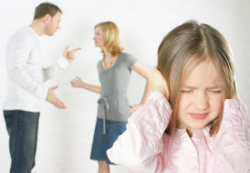
The Therapist as a Child of Divorce:
Many professionals in the divorce world have experienced divorce themselves, either as an adult or as a child. This brings sensitivity to the work. Perhaps they even make better therapists or doctors.
In this guest blog by Donna C. Moss, we learn about children and divorce from her perspective as an adult child of divorce, and as an experienced therapist. It’s worth reading.
----
I once read something by famous divorce researcher that stuck with me all these years. Blakeslee and Wallerstein surmised that for some children it might have been better if a parent had died because at least there’s a beginning, middle and end.
In other words, with some divorces, the trauma never ends.
Personal Experience Counts:
Blakeslee and Wallerstein went on to say that the long-term relationship effects on children of divorce can sometimes be more damaging than people imagine. I was reminded of this recently when my Father came for his once-a-season visit to NY. Even though we are all well into adulthood now, with children of our own, it’s still upsetting when he has to shuttle between my sister and I, when the visits are intense but short, and when we still suffer the economic sting that resulted from my parents’ divorce 30+ years ago.
- Now my Father’s second wife announces that they too are getting a divorce and I literally crumble like a house of cards. I have never felt so raw. It hits at your fundamental sense of security like a lashing storm, and it doesn’t let up. Even with my own therapy, it’s the pain that keeps on giving.
Ironically, my passion for this topic has yielded rewards.
Several lawyers in my area refer to me with new divorce cases. They say, you must get into counseling; the whole family. And then I do good damage control, remind the kids of their “bill of rights” and remind the parents over and over, please reassure them, explain simply and clearly and keep conflicts to a minimum.
Childproof Divorce Whenever Possible:
More times than not, my job is to minimize confusion. You cannot believe what’s in these kids’ heads! Often they go right to the most concrete: will my room be pink at Mom’s house still? Can I have two stuffed animals—one for each house? If my parent’s separate, will I ever see Dad again? Are my grandparents still gonna be my grandparents? … Demystifying the wild ideas they formulate goes a long way to mitigating constant anxiety and dread.
And of course at every age and phase, the effects are different. People ask me, what age is best for divorce on children? Some question. None. Younger kids experience regression and confusion while older kids feel lost, insecure and socially stigmatized. Yes, even in 2013. The economic uncertainty creates myriad additional problems (kids often get less than their peers after divorce). Plus, shuttling between two homes can be disorienting.
If you’re a kid (like I was) who forgets things, UGH. Best to get two of everything! I once had a quarreling couple in my office fighting about gym sneakers. Finally I said, do you hear how absurd this is? Get a second pair!
When I led groups for the Supreme Court of the State of NY for parents in custody litigation they made a very handy pamphlet. I still use it today. It lists all the Do’s and Don’ts for parenting during and after divorce and even introduces concepts such as how to handle holidays and parenting agreements.
Keep Conflict Between the Adults:
Increasingly, there are complications such as if a child has a disability. Parents are generally willing to be hands on, but in the high-conflict case, they cannot get past their stacks of papers, motions and taped conversations. I sometimes feel sick inside: all that money on attorneys when the kids could have gone to camp! Ah to be naïve.
Here is a fictional case, but its made up of a composite of stories that I've heard.
- Anthony came to therapy as an unhappy 15 yr.old who was crying himself to sleep at night. His father was hanging out with a lady down the street and his mother could do nothing about it. The parents openly fought, and the poor kid was literally sick as a result. He couldn't stand any of the adults in his life. Finally after coaching the parents to clean up their business before foisting it on their children, the child’s anxiety relaxed to where he could at least function in school. The parents resolved that issue, but never came back. I can only wonder what the now 17 yr. old is worried about now.
The parents in these cases are very appreciative of therapy because they are so mired in their own problems and difficulties; they fail to see the simple things their kids require. So remember, divorce is for adults, not children. For more on ages and stages of divorce impact see:
http://www.extension.purdue.edu/providerparent/family-child%20relationships/ChildrensReactions.htm
-----
To find out more about Donna Moss, LCSW-R see: www.donnacmoss.com
__
More from Dr. Banschick:
Intelligent Divorce Webinars for Parents: Sign Up
Intelligent Divorce CE Credit for Therapists: Sign Up
Online Approved Divorce Parenting Course: Sign Up
Twitter: twitter.com/MarkBanschickMD
Radio Show: www.divorcesourceradio.com/category/audio-podcast/the-intelligent-divorce
Sign up for our newsletter here!




